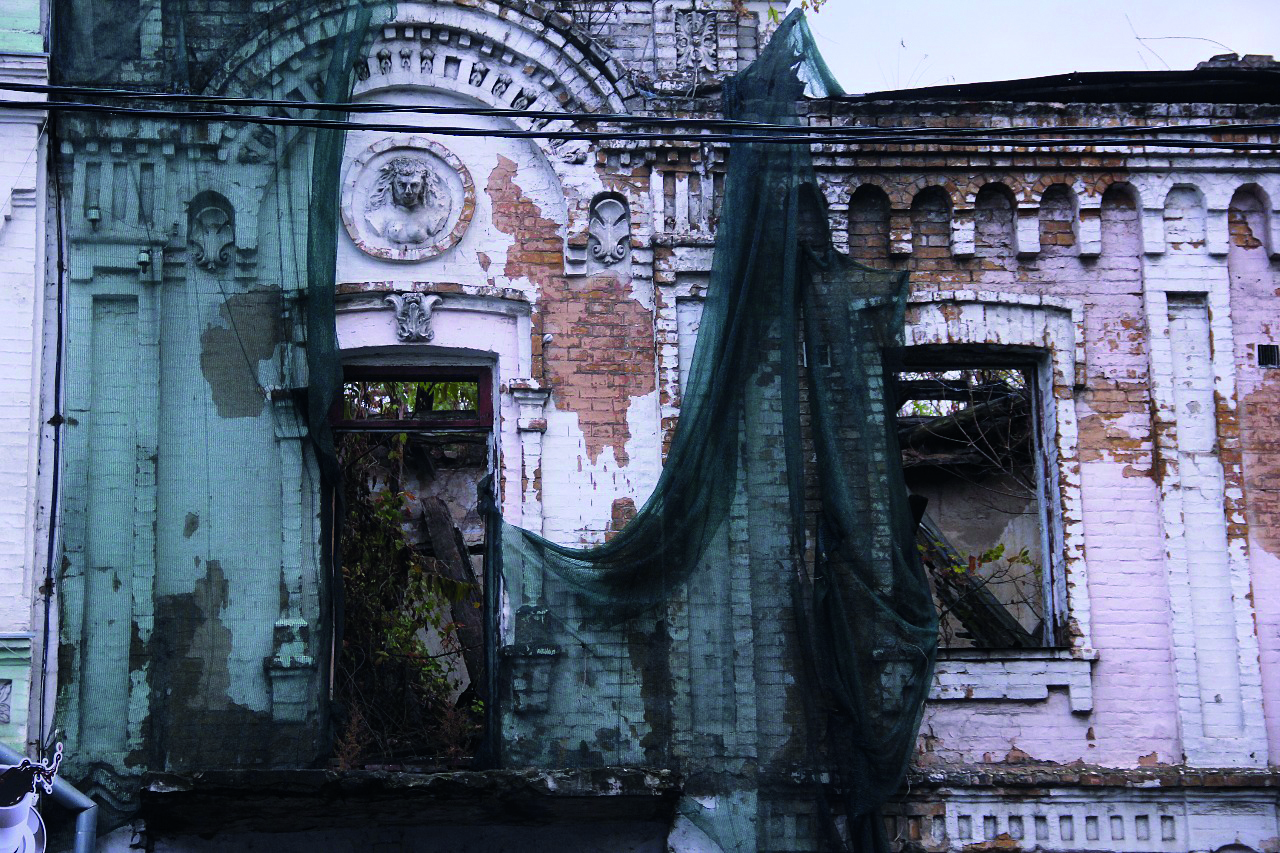Ukraine’s Wild, Wacky, and Winning History at Eurovision

From political anthems to ethno-pop power ballads to a European drag queen icon: Ukraine has become one of Eurovision’s most reliable countries for show stopping, memory-making performances.
Today was supposed to be the coming-out party for Ukraine’s wonderful electro-folk group Go_A. The group was set to debut their uber-catchy hit Solovey (Nightengale) at the first semifinal of Eurovision 2020 in Rotterdam, Netherlands, had COVID-19 not wiped out the event. The group — tapped as one of the early frontrunners set to compete — was ready to add to Ukraine’s already sterling Eurovision reputation. Since debuting in 2003, Ukrainian artists have won twice, cracked the Top 3 five times, and qualified for every final at Europe’s chicest celebration of pop kitsch — a record better than any other nation during that time. It’s a shame that Europe will have to wait another year to discover what we already know: just how great Go_A sounds. The competition has already made household names in Europe of some of the most popular Ukrainian artists, such as Ruslana, Jamala, Tina Karol, Verka Serduchka, and even GreenJolly.
Since there’s no Eurovision 2020 to tune into this week, let’s take a look back at Ukraine’s wild, wacky, and winning history at the Eurovision Song Competition.
“Wild” Successes
It took Ukraine a little time to discover the wonderful wackiness that is Eurovision. But when Ukraine’s classically trained, seven-time Artist of the Year Oleksandr Ponamariev went up against Russia’s faux-lesbian t.A.T.u. in 2003, Ukrainians were hooked. Much of the country tuned in the next year to see Ruslana’s rocking ethno-pop anthem Wild Things blow audiences away, shocking Europe by winning Ukraine’s second year in the competition. The gorgeous Svetlana Loboda — who had just withdrawn from musical group VIA Gra (aka the “Ukrainian Spice Girls”) — was expected to represent Ukraine the next year. Though, she then had to wait until 2007, since the Orange Revolution got in her way (see below). Her video for I Will Forget You won the 2005 OGAE Video Contest among official Eurovision fan clubs. Tina Karol, another mainstay on Ukrainian charts who currently hosts Ukraine’s ‘The Voice’, finished seventh in 2006, starting a run of nine Top 12 finishes for Ukraine in the ten years following.
“Winning” Political Entries
Clothed in vyshyvankas (national embroidered shirts) and jeans, belting out ethno-rock songs set to Shakira-style dance moves, Ruslana’s win in 2004 helped trigger a reawakening of the modern Ukrainian identity. Feeling confident that Ukraine’s “European-ness” was now recognised by foreign countries, Ukrainians took to the streets in the Orange Revolution to overturn a fraudulent election that was deemed corrupt. Months later, thanks to Ruslana’s win, Kyiv hosted Eurovision 2005. Still buzzing with revolutionary zeal, Ukraine made the curious choice of GreenJolly’s Orange Revolution anthem Together We Are Many (Razom Nas Bahato) for its first time as host. Politics continued to define Ukraine at Eurovision. After pulling out of the competition in 2015 due to the Russian invasion of Crimea and the War in Donbas, Ukraine returned in 2016 with a politically-charged entrance from talented Crimean Tatar diva, Jamala. Her emotional 1944 ode to the Soviet deportation of Crimean Tatars became Ukraine’s Eurovision winner. Russia refused to participate when Ukraine hosted in 2017. Then in 2019, Ukraine lost its entry act, Maruv, when the band wouldn’t commit to the Ukrainian broadcaster’s rule of never again playing in Russia.
Double-Take: Ukraine had two representatives at Eurovision 2009 when Kyiv’s Anastasiya Prikhodko won Russia’s selection contest after being passed over in Ukraine. She finished 11th, one spot ahead of Ukraine’s Svetlana Loboda. After the Russian invasion of Crimea, Prikhodko became politically active and now refuses to perform in Russian. She tried to compete for Ukraine in Eurovision 2016 but lost to eventual winner Jamala.
“Wacky” Babushkas in Drag
What started as a tongue-in-cheek, babushka-in-drag comedy act, Verka Serduchka was the surprise choice to represent Ukraine in 2007. Who’d have thought a drag act would come out of such a traditional, Christian country like Ukraine? In addition to this, she also dressed in shiny silver with a giant star on her head; she turned Eurovision upside down. Combining cheeky, upbeat lyrics with kitschy sexual innuendo has turned Dancing Lasha Tumbai into the unofficial Eurovision anthem. Called “the greatest song to never win” by Britain’s The Guardian, the song was even featured in the Melissa McCarthy Hollywood film Spy nearly a decade later. Following in Verka’s oversized footsteps was Ani Lorak, who also finished second with her sultry Shady Lady. Ukraine would continue its remarkable run at Eurovision with Alyosha finishing tenth in 2010 with Sweet People, Mika Newton finishing fourth in 2011 with Angel, and Zlata Ognevich finishing third in 2013 with Gravity. Mariya Yaremchuk’s Tick-Tock finished a solid sixth before Ukraine was forced to pull out of the competition due to the Russian invasion of Crimea.
Verka Serduchka Eurovision video
Worthy, but Luckless
Go_A is the latest in a series of Ukrainian acts that have been robbed of the chance to become the next Ruslana, Jamala, or Verka Serduchka. Maruv was the early Eurovision favourite last year, before withdrawing. After winning a stiff national competition against groups like Kazka — whose Plakala has racked up almost 350 million views online — Maruv won the 2019 OGAE Video Contest, showing that Siren Song was likely destined for Eurovision greatness. The year before, Voice of Ukraine runner-up and jury favourite Tayanna — Ukraine’s best act to have competed at Eurovision — lost the televote in the national competition to X-Factor Ukraine winner Melovin. That year, her song Lelya finished third at the OGAE Second Chance competition, which is a Eurovision for artists that couldn’t quite make it out of their own countries. Ukraine’s Vidbir selection competition has turned into one of the biggest music events of the year. The competition attracts many of the country’s top talents to the three semifinals — like Jamala, Tina Karol, and Verka Serduchka to name a few — and winners are selected partly by televote and partly by jury.
Be sure to check out Go_A’s Solovey and tune in next year to see if they can become Ukraine’s newest Eurovision success story.
Ukraine at Eurovision
2003
Oleksandr Ponomariov
Hasta La Vista
14
https://youtu.be/iRxflMaHhBI
2004
Ruslana
Wild Dances
1
https://youtu.be/10XR67NQcAc
2005
GreenJolly
Razom Nas Bahato
19
https://youtu.be/N5u6J_mbhLU
2006
Tina Karol
Show Me Your Love
7
https://youtu.be/mRqhkwTIuU8
2007
Verka Serduchka
Dancing Lasha Tumbai
2
https://youtu.be/hfjHJneVonE
2008
Ani Lorak
Shady Lady
2
https://youtu.be/L6M300uBc7U
2009
Svetlana Loboda
Be My Valentine!
12
https://youtu.be/rGJqLCuqssc
2010
Alyosha
Sweet People
10
https://youtu.be/20CPPV_uwmE
2011
Mika Newton
Angel
4
https://youtu.be/mx1wAj_oVdE
2012
Gaitana
Be My Guest
15
https://youtu.be/sLsTn_li5d8
2013
Zlata Ognevich
Gravity
3
https://youtu.be/BMxpv8naRd8
2014
Mariya Yaremchuk
Tick-Tock
6
https://youtu.be/slHboKF9PIQ
2015
Cancelled due to War
2016
Jamala
1944
1
https://youtu.be/B-rnM-MwRHY
2017
oTorvald
Time
24
https://youtu.be/mogNLkIEI0k
2018
Melovin
Under the Ladder
17
https://youtu.be/lhOuMYtQ94M
2019
Maruv
Siren Song (Bang!)
Withdrew
https://youtu.be/po5NQ4OzzzI
2020
Go_A
Solovey
Cancelled
https://youtu.be/zNetXPSld50
2021
Go_A
(To Be Determined)











